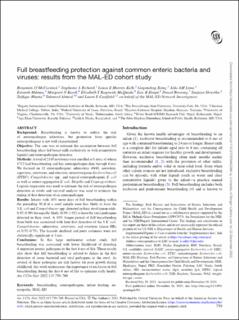Full breastfeeding protection against common enteric bacteria and viruses: Results from the MAL-ED cohort study
Mccormick, Benjamin J. J; Richard, Stephanie A; Murray-Kolb, Laura E; Kang, Gagandeep; Lima, Aldo A. M; Mduma, Estomih; Kosek, Margaret N; Rogawski Mcquade, Elizabeth T; Houpt, Eric R; Bessong, Pascal; Shrestha, Sanjaya; Bhutta, Zulfiqar; Ahmed, Tahmeed; Caulfield, Laura E; Acosta, Angel Mendez; De Burga, Rosa Rios; Chavez, Cesar Banda; Flores, Julian Torres; Olotegui, Maribel Paredes; Pinedo, Silvia Rengifo; Salas, Mery Siguas; Trigoso, Dixner Rengifo; Vasquez, Angel Orbe; Ahmed, Imran; Alam, Didar; Ali, Asad; Bhutta, Zulfiqar A.; Qureshi, Shahida; Rasheed, Muneera Abdul; Soofi, Sajid; Turab, Ali; Yousafzai, Aisha; Zaidi, Anita K. M.; Bodhidatta, Ladaporn; Ammu, Geetha; Babji, Sudhir; Bose, Anuradha; George, Ajila T.; Hariraju, Dinesh; Jennifer, M Steffi; John, Sushil; Kaki, Shiny; Karunakaran, Priyadarshani; Koshy, Beena; Lazarus, Robin P.; Muliyil, Jayaprakash; Ragasudha, Preethi; Raghava, Mohan Venkata; Raju, Sophy; Ramachandran, Anup; Ramadas, Rakhi; Ramanujam, Karthikeyan; Rose, Anuradha; Roshan, Reeba; Sharma, Srujan L.; Shanmuga Sundaram, Sundaram; Thomas, Rahul J.; Pan, William K.; Ambikapathi, Ramya; Carreon, J. Daniel; Doan, Viyada; Hoest, Christel; Knobler, Stacey; McCormick, Benjamin J. J.; McGrath, Monica; Miller, Mark A.; Psaki, Stephanie; Rasmussen, Zeba; Seidman, Jessica C.; Gottlieb, Michael; Lang, Dennis R.; Tountas, Karen H.; Svensen, Erling; Amour, Caroline; Bayyo, Eliwaza; Mduma, Estomih R.; Mvungi, Regisiana; Nshama, Rosemary; Pascal, John; Swema, Buliga Mujaga; Yarrot, Ladislaus; Mason, Carl J.; Shamsir Ahmed, Ahmed; Alam, Md Ashraful; Haque, Rashidul; Haque, Umma; Hossain, Md Iqbal; Islam, Munirul; Mahfuz, Mustafa; Mondal, Dinesh; Nahar, Baitun; Tofail, Fahmida; Chandyo, Ram Krishna; Shrestha, Prakash Sunder; Shrestha, Rita; Chandyo, Manjeswori Ulak; Bauck, Aubrey; Black, Robert E.; Checkley, William; Lee, Gwenyth O.; Schulze, Kerry; Yori, Pablo Peñataro; Ross, A. Catharine; Schaefer, Barbara; Simons, Suzanne; Pendergast, Laura; Abreu, Cláudia B.; Costa, Hilda; Di Moura, Alessandra; Filho, José Quirino; Havt, Alexandre; Leite, Álvaro M.; Lima, Noélia L.; Lima, Ila F.; Maciel, Bruna L. L.; Medeiros, Pedro H. Q. S.; Moraes, Milena; Mota, Francisco S.; Oriá, Reinaldo B.; Quetz, Josiane; Soares, Alberto M.; Mota, Rosa M. S.; Patil, Crystal L.; Mahopo, Cloupas; Maphula, Angelina; Nyathi, Emanuel; Samie, Amidou; Barrett, Leah; Dillingham, Rebecca; Gratz, Jean; Guerrant, Richard L.; Houpt, Eric; Petri, William A.; Platts-Mills, James; Rogawski, Elizabeth; Scharf, Rebecca; Rogawski, Elizabeth T.; Shrestha, Binob; Rayamajhi, Bishnu Bahadur; Strand, Tor Arne
Journal article, Peer reviewed
Published version

Åpne
Permanent lenke
https://hdl.handle.net/11250/3039703Utgivelsesdato
2022Metadata
Vis full innførselSamlinger
Originalversjon
American Journal of Clinical Nutrition. 2022, 115 (3), 759-769. 10.1093/ajcn/nqab391Sammendrag
Background
Breastfeeding is known to reduce the risk of enteropathogen infections, but protection from specific enteropathogens is not well characterized.
Objective
The aim was to estimate the association between full breastfeeding (days fed breast milk exclusively or with nonnutritive liquids) and enteropathogen detection.
Methods
A total of 2145 newborns were enrolled at 8 sites, of whom 1712 had breastfeeding and key enteropathogen data through 6 mo. We focused on 11 enteropathogens: adenovirus 40/41, norovirus, sapovirus, astrovirus, and rotavirus, enterotoxigenic Escherichia coli (ETEC), Campylobacter spp., and typical enteropathogenic E. coli as well as entero-aggregative E. coli, Shigella and Cryptosporidium. Logistic regression was used to estimate the risk of enteropathogen detection in stools and survival analysis was used to estimate the timing of first detection of an enteropathogen.
Results
Infants with 10% more days of full breastfeeding within the preceding 30 d of a stool sample were less likely to have the 3 E. coli and Campylobacter spp. detected in their stool (mean odds: 0.92–0.99) but equally likely (0.99–1.02) to have the viral pathogens detected in their stool. A 10% longer period of full breastfeeding from birth was associated with later first detection of the 3 E. coli, Campylobacter, adenovirus, astrovirus, and rotavirus (mean HRs of 0.52–0.75). The hazards declined and point estimates were not statistically significant at 3 mo.
Conclusions
In this large multicenter cohort study, full breastfeeding was associated with lower likelihood of detecting 4 important enteric pathogens in the first 6 mo of life. These results also show that full breastfeeding is related to delays in the first detection of some bacterial and viral pathogens in the stool. As several of these pathogens are risk factors for poor growth during childhood, this work underscores the importance of exclusive or full breastfeeding during the first 6 mo of life to optimize early health.
